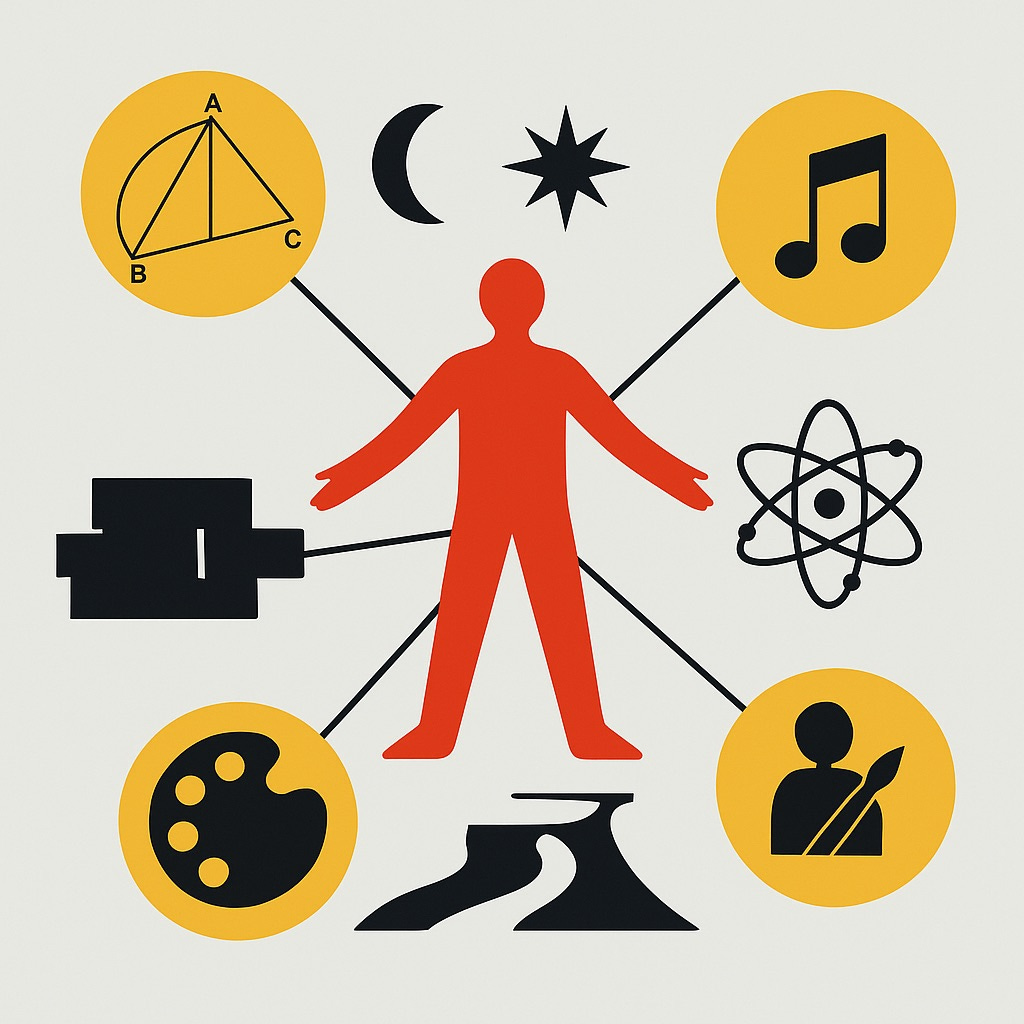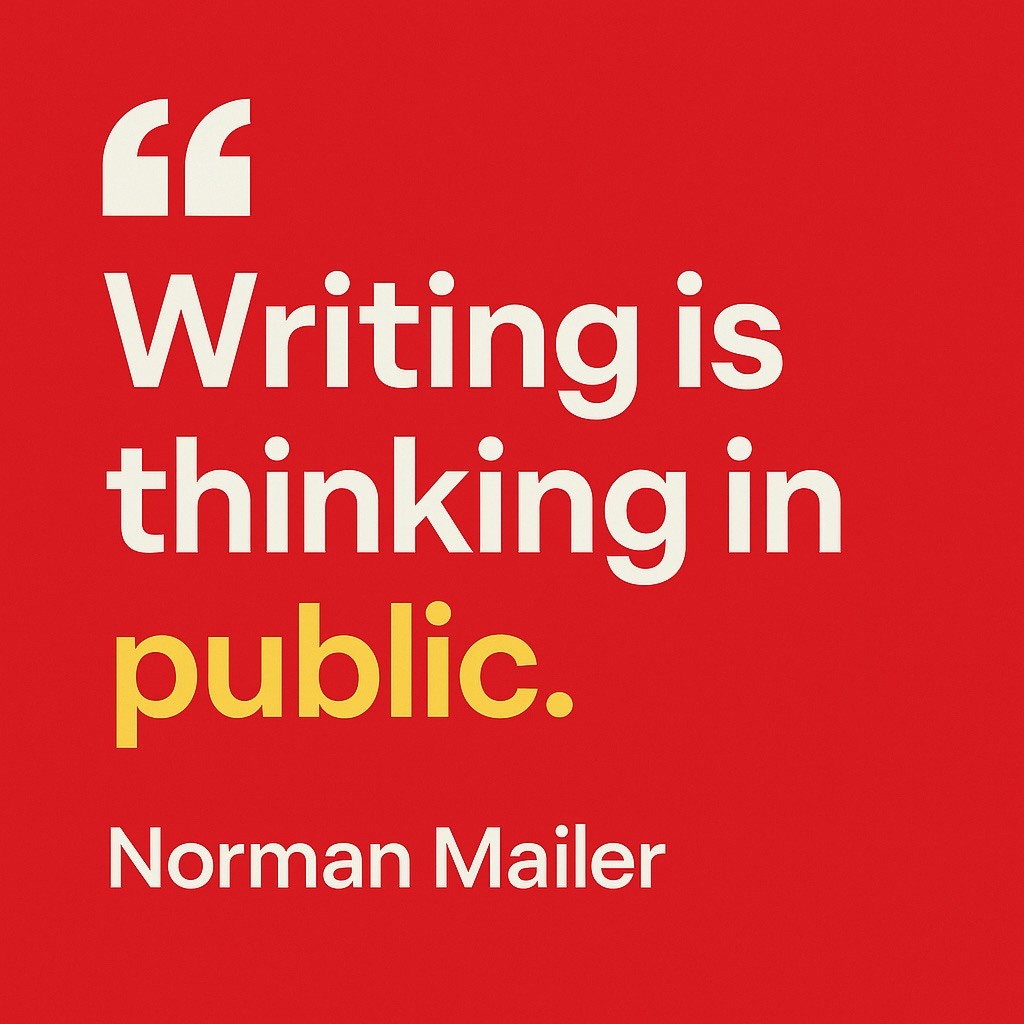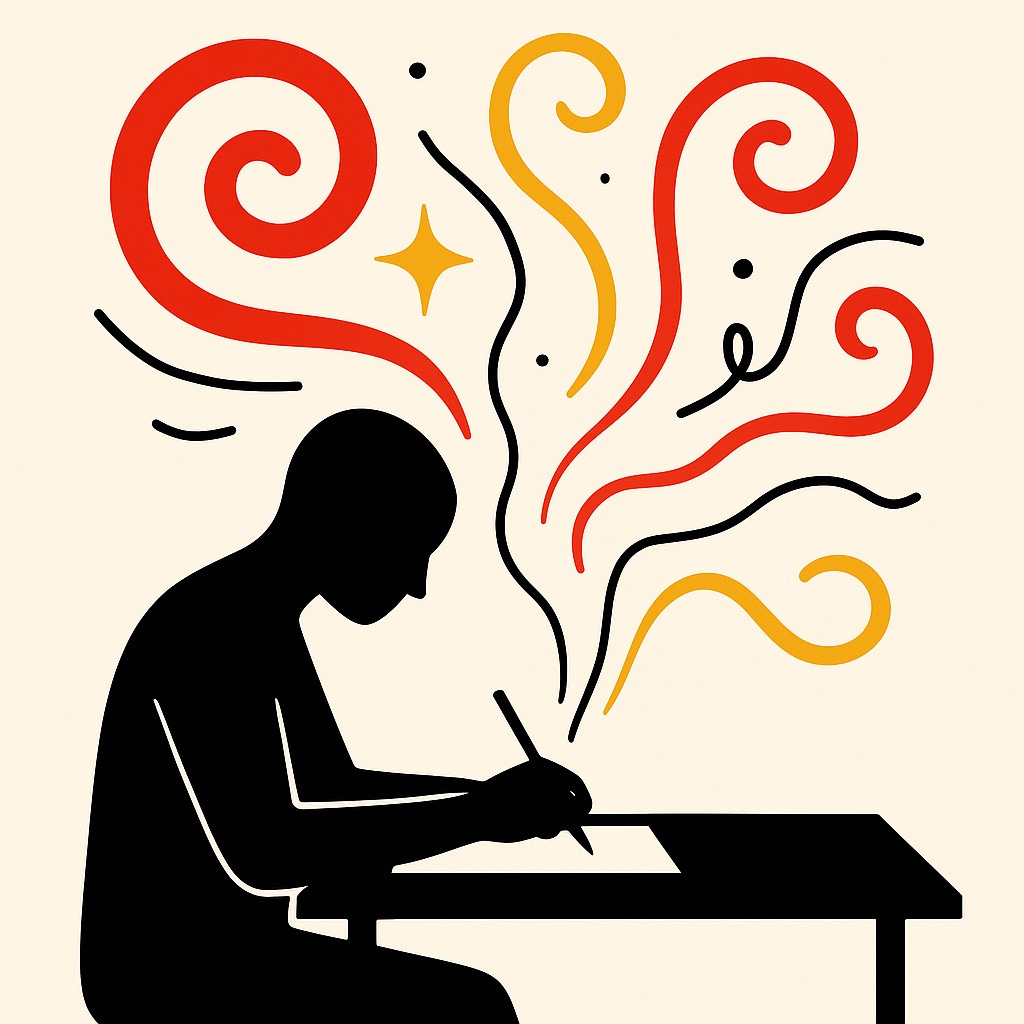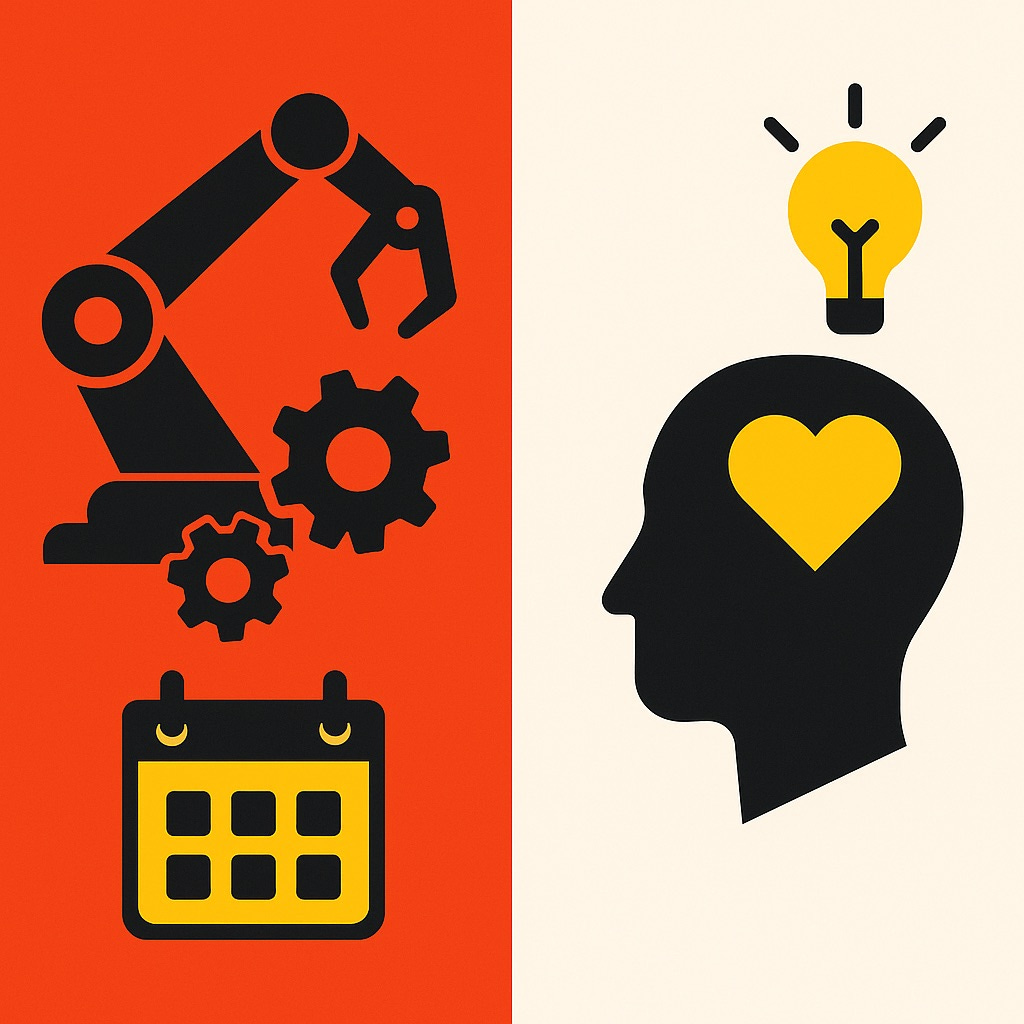Build Your Forever Stack
Learn across domains, write to think, and let AI multiply your impact.
The failure of memorization and the promise of discovery
Growing up, many of us were taught to memorize facts and formulas because that’s what the school system rewarded. You cram, regurgitate and forget. It felt like education was an assembly line; you could produce the right answers on cue, but rarely understand why you cared about them.
That model made sense in the 20th century when schools were designed to produce compliant factory workers. Today, machines are the perfect factory workers. Artificial intelligence can memorize and regurgitate more efficiently than any human. Clinging to rote learning in an AI age is like bringing a knife to a gunfight.
So what’s the alternative? Discovery. In unschooling communities, children set their own curriculum. There are no tests or grades; they learn through living and pursue topics that ignite their curiosity, whether it’s engineering or ancient Egypt. Studies of unschooled students find that this self‑directed approach fosters personal responsibility and a desire to learn.
Beyond rote learning
Discovery‑driven learning allows you to test ideas in the real world, calibrate based on feedback and cultivate antifragility instead of brittle expertise. Rather than asking, “What will be on the test?” you begin to ask, What problems do I want to solve?
Humans are deep generalists: embracing breadth and curiosity
Human beings are born polymaths. History’s greatest breakthroughs rarely came from people with a single narrow specialty. Johannes Kepler drew on geometry, music and mysticism; Isaac Newton studied alchemy alongside mathematics. That cross‑pollination of ideas gave them leverage that specialists lacked.
So why do we still pressure ourselves to pick one lane? A modern conception of deep generalism argues that innovation flourishes when breadth meets depth. University World News suggests we should aspire to journeyman‑level expertise across domains, gaining enough proficiency to connect disciplines and spot patterns. The Pareto principle applies to skills: you can achieve roughly 80 % of competence in a new field with focused practice — months rather than decades.
Why generalists thrive
Broad exposure isn’t just nice; it’s adaptive. Research summarized in Greater Good Magazine — drawing on David Epstein’s book Range — suggests that generalists outperform specialists in so‑called “wicked” environments, where rules are unclear and feedback is slow. Interleaving lessons across different subjects leads to better memory and creative leaps. People who explore multiple interests before settling on a career ultimately find better matches and greater satisfaction.
Early specialization works well only in “kind” environments like chess or music, where patterns are consistent. Our world of technology, entrepreneurship and social change is the opposite: messy and unpredictable. To solve problems we need to draw from psychology, design, economics and art at once.
Being a deep generalist doesn’t mean you become a dilettante; it means you cultivate a portfolio of skills and the ability to learn new ones quickly. When the market shifts or a tool becomes obsolete, you reconfigure your skills rather than start from scratch. Automation frees humans to engage in creative problem solving and emotional agility. Machines can crunch data, but humans still excel at synthesizing across domains and making sense of ambiguity.
How to learn, think and earn: the future‑proof manifesto
So how do you escape the trap of narrow specialization and build a life that can bend without breaking? Over the past few years I’ve been experimenting with a future‑proof skill stack. It boils down to four verbs: learn, think, earn, lead.
The four‑verb formula
Learn: Choose projects that ignite your curiosity and apply the Pareto principle to gain functional proficiency quickly.
Think: Reflect on what you learn and deliberately test your assumptions. Critical thinking means not taking facts at face value; it’s a muscle you build through practice.
Earn: Create value rather than waiting for credentials — launch simple products, write, build communities. In a permissionless economy, you don’t need a gatekeeper to start.
Lead: Take responsibility for your learning and decisions. Agency is the antidote to complacency, and leadership begins with self‑leadership.
In a world where anyone can teach themselves almost anything, broad knowledge, critical thinking and the courage to act are the new credentials.
Writing as a meta‑skill: thinking made visible
Whenever I feel stuck, I write — not to go viral, but to understand. Norman Mailer said he didn’t know what he thought until he wrote it; Joan Didion wrote to find out. Writing integrates analysis and revision, turning passive consumption into active construction.
A study of biology students showed that regular writing exercises improved analysis and inference skills more than quizzes. Have you ever noticed how teaching something forces you to master it? Writing works the same way.
Why write?
Clarity: Daily writing clarifies your thinking and accelerates learning. When you try to explain something clearly, you identify gaps in your understanding.
Legacy: Over time your essays and notes become a searchable knowledge base that others can benefit from.
Leverage: Teaching through writing forces you to master material more deeply. In an AI age, writing makes your unique perspective visible — something large language models can imitate but never originate.
Treat writing as thinking in public and your ideas will compound. A habit of reflection not only serves you but also invites others into your process.
Taste and curation: your competitive edge in an AI‑saturated world
Generative AI and algorithmic feeds are flooding the internet with content. As Brainz Magazine notes, this deluge fuels a longing for authentic human expression. When every timeline is filled with similar templates, volume creates fatigue. In a world where creation is cheap, discernment is scarce.
That’s why taste matters. Voyage Studio points out that AI tools make it easy to pump out content, but the sea of sameness they produce elevates the value of intentional, crafted work. Craftsmanship involves attention to detail, coherence and thoughtful design. Taste is cultivated through exposure, reflection and feedback.
Cultivate taste
Surround yourself with work that inspires you, note what resonates and share your selections. Developing taste doesn’t make you a snob; it makes you a curator who filters noise for your community.
Authenticity is part of taste. Human flaws and lived experiences cannot be replicated by AI. Imperfections, doubts and humor signal that a real person is behind the screen. When you lean into your idiosyncrasies, you build trust. Discernment and authenticity are your edges in an AI‑saturated world.
AI as your co‑founder: wearing multiple hats without losing your humanity
AI isn’t just about generating text; it’s about augmenting what one person can do. AI agents can handle customer support, scheduling and marketing, allowing solo founders to focus on high‑value work. No‑code tools and AI writing assistants enable individuals to execute campaigns without a team.
Investors now speculate about one‑person billion‑dollar companies. Yet the same coverage cautions that trust and relationships still matter. AI can scale your output, but it can’t shoulder your emotional load or replace a co‑founder’s support.
Keep your humanity
Overreliance on AI can erode the very qualities that differentiate us. California Management Review warns that chasing automation without preserving human judgment sidelines creativity, empathy and ethics. The authors argue that uniquely human skills — nonlinear thinking, empathetic leadership and experiential storytelling — grow in value as AI advances.
AI can surface insights and handle routine tasks, but humans must decide which insights matter and how to frame them. Treat AI as a collaborator, not a boss: let it handle mechanical work while you focus on nuance.
Building your future‑proof skill stack
Future‑proofing yourself isn’t about chasing every trend; it’s about building a skill stack that compounds. The following practices weave together to make you resilient in a changing world:
Follow your curiosity: Adopt the unschooling mindset by letting questions guide your learning.
Use the 80/20 rule: Apply the Pareto principle to gain functional proficiency in new domains. Interleave subjects to improve memory and creativity.
Write regularly: Clarify your thinking and build a body of work through consistent writing and daily reflection.
Cultivate taste: Curate what resonates and invest in craftsmanship.
Collaborate with AI: Harness AI for administrative tasks and drafts while retaining human oversight.
Invest in soft skills: Empathy, ethics and storytelling become more valuable as technology advances.
Sharing your journey publicly builds community and multiplies your impact. Which of these steps will you tackle first?
Conclusion: the path to becoming a deep generalist creator
In an age of AI saturation and constant change, memorizing the “right answer” is the wrong strategy. Discovery‑driven learning invites you to ask better questions, chase your curiosity and accept failure as feedback. Humans are deep generalists by nature; we thrive when we weave knowledge across fields, like Kepler and Newton did.
Writing makes thinking visible and sharpens your mind. Taste and curation help you stand out in a flood of generated content. AI can be a powerful partner if you let it handle the rote work while you focus on empathy, ethics and storytelling. Together, these elements form a future‑proof skill stack.
You don’t need to become a superhuman; you need to become more human. By leaning into your curiosity, building breadth alongside depth, writing to understand, curating with intention and collaborating with AI rather than competing with it, you can create a life and career that adapts to change instead of being crushed by it.
The manifesto isn’t a prescription; it’s an invitation. Choose discovery over memorization, build your own ladder and lead with your humanity.
Act on it
Ready to put this manifesto into practice? Start by sharing one small learning experiment on your social feed and invite others to hold you accountable. When you write, curate and build with curiosity, you not only future‑proof yourself but also inspire a community of fellow deep generalists. Let’s learn out loud together and build a world where discovery, taste and humanity guide technology.
--
Hope this sparked something. A question, a project, a shift in mindset.
Stay curious, keep building your stack, and if it resonated, I’d love for you to Subscribe.
— Brian






